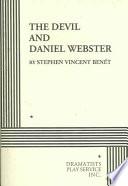
The Devil and Daniel Webster (1937)
Context: Finally, it was time for him to get up on his feet, and he did so, all ready to bust out with lightning and denunciations. But before he started he looked over the judge and jury for a moment, such being his custom. And he noticed the glitter in their eyes was twice as strong as before, and they all leaned forward. Like hounds just before they get the fox, they thickened as he watched them. Then he saw what he'd been about to do, and he wiped his forehead, as a man might who's just escaped falling into a pit in the dark.
For it was him they'd come for, not only Jabez Stone. He read it in the glitter of their eyes and in the way the stranger hid his mouth with one hand. And if he fought them with their own weapons, he'd fall into their power; he knew that, though he couldn't have told you how. It was his own anger and horror that burned in their eyes; and he'd have to wipe that out or the case was lost. He stood there for a moment, his black eyes burning like anthracite. And then he began to speak.
